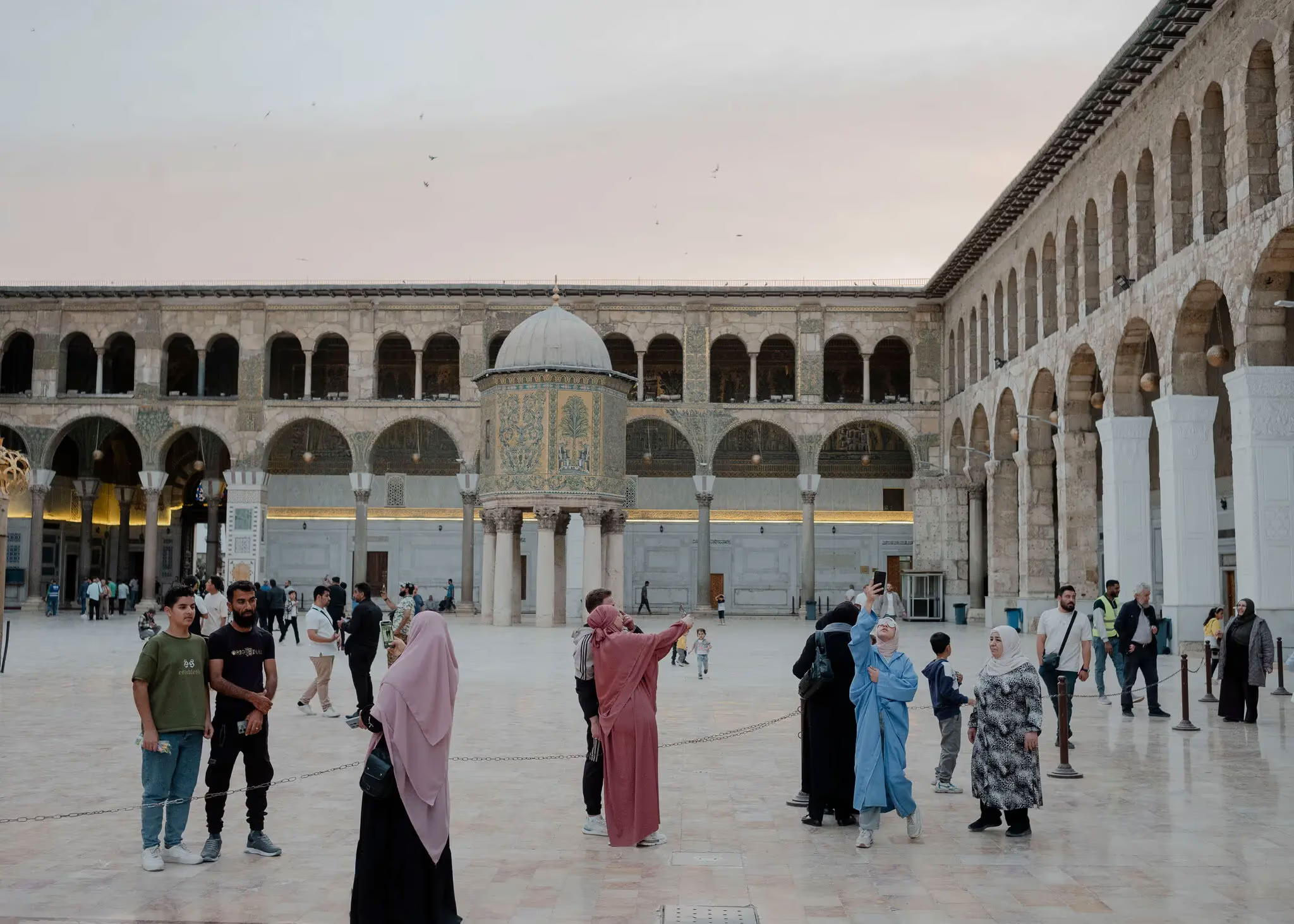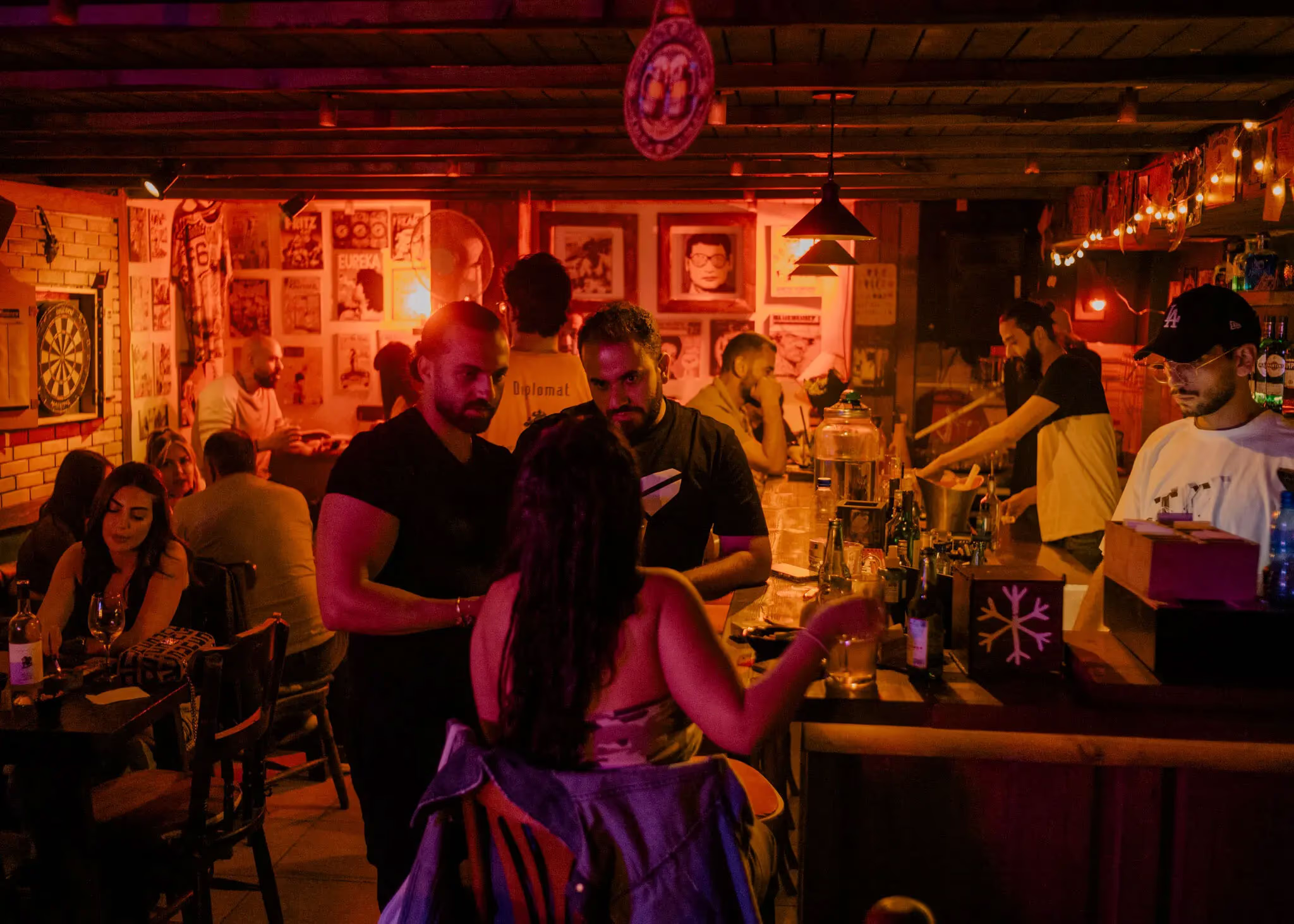In December, power shifted in Syria: former rebels from Idlib overthrew Bashar al-Assad and seized control of Damascus. They promise to respect the country’s diversity, but changes are already visible in the capital—from dress codes on beaches to attacks on bars and nightclubs. For some, it is a long-awaited triumph of religious values; for others, a worrying sign of the end of the secular Syria they knew.
In the narrow medieval streets of Old Damascus, where bars hide among churches, mosques, and antique shops, Thursday used to be party night. Live DJ sets, shots, crop tops, raves—under Bashar al-Assad’s brutal and repressive rule, Syrians had no political freedoms, but secular Muslims and non-Muslims in the capital could dress, drink, and dance as they pleased.
In the rural province of Idlib—where Syria’s new Islamist leaders had carved out a rebel mini-state during the civil war before toppling Assad and taking Damascus in December—the strongest drink available is coffee. Cafés are forbidden from playing music. Even hookahs are banned.
For years, cosmopolitan Damascus had little interaction with more conservative Syrians from other regions. Now some of the country’s most secular neighborhoods are run by those with the most religiously conservative views.
The change has energized religious Sunnis in the capital but unsettled secular Syrians and religious minorities. While the new government has so far refrained from imposing harsh restrictions on social freedoms, the sharp rise in the influence of hardliners and an increasingly conservative atmosphere are prompting liberal-minded residents to alter their behavior—fearing what might come next.
Many worry that the new government, led by President Ahmed al-Sharaa—a former rebel who once collaborated with al-Qaeda and the Islamic State—will impose extremely strict Islamic rule across the country.
“What are we now, Afghanistan?” says 40-year-old Nivin Torossian, a Christian and co-owner of Tiki Bar, one of Old Damascus’s oldest nightlife venues.

Nivin Torossian (right), owner of Tiki Bar in Damascus. She says armed men claiming to represent the government have repeatedly questioned her about parties and alcohol consumption at the venue.
She recalls that one spring night, as a party was in full swing, a group of armed government representatives entered the venue. With stern expressions, they demanded an immediate end to the festivities and later returned repeatedly to find fault with the parties and alcohol consumption. Now, she and other owners say, the bars of Old Damascus are mostly empty.
The new government has pledged to respect Syria’s diversity, but the president has concentrated power within a tight circle of allies, filled state institutions and security forces with people from Idlib, and failed to prevent attacks on minorities—including a suicide bombing at a Damascus church in June.
A dress code has been introduced requiring women on public beaches to wear modest swimsuits and loose cover-ups. In public places, according to the decree, shoulders and knees should be covered, and “transparent or overly tight clothing” avoided.
After a wave of backlash on social media, Deputy Tourism Minister Ghiyath al-Farrah said in a television interview that the document was advisory and “takes into account” the interests of different “social groups”—a clear nod to the country’s substantial conservative population.
Even without strict enforcement, the atmosphere has shifted this summer: there are fewer bikinis and less alcohol on the Mediterranean beaches, more burkinis, and some liberal-minded Syrians now avoid such places for fear of pressure from conservatives.
For many residents, any alternative to Bashar al-Assad’s rule—during which he bombed, gassed, and tortured his own people to cling to power—seems positive. But Nivin Torossian and others say all of this together marks the end of the Syria they once knew—a country where people of different faiths lived side by side for centuries.
“If you want to pray, pray. If you want to drink, drink. Why can’t we just leave it that way?” she says.
How the Rise to Power of Idlib Natives Is Changing the Look and Feel of Damascus
The new authorities have not passed laws restricting the sale of alcohol, music, or socializing between men and women, nor have they required women to wear headscarves or curtailed their rights. Yet many residents say the atmosphere of religious conservatism in Damascus has grown markedly stronger.
The former ruling Baath Party, long controlled by the Assad family, maintained the state’s secular character as a means of holding on to power. By suppressing visible expressions of Islamic religiosity, Assad secured the backing of minorities who feared domination by the Sunni majority.

Since December, Damascus has seen a noticeable influx of newcomers from more conservative rural parts of Syria.
Since December, Damascus has been flooded with newcomers from other parts of Syria, many bringing far more conservative views with them. Government offices and police stations are now staffed with veterans of Idlib’s puritan administration, and the black uniforms of security forces—made up of former rebels—have replaced the army fatigues of Assad’s troops. Since the coup, a “rebel-style” beard has become fashionable in the capital.
“We’ve always had people of all religions here, and we never crossed the line of coexistence,” says 27-year-old Maria Kadah, a Muslim whose parents are a Sunni father and Shia mother, and who prefers shorts to a headscarf. Until recently, she headed marketing for an alcohol import company. “And now we see new people who openly say, ‘We don’t accept your existence at all.’”
A clash of worldviews unfolded before our eyes over dinner, when a former rebel—now a security officer who introduced himself as Abu Yazan—tried to make casual conversation with our driver, Khaled.
“Who’s your favorite sheikh?” Abu Yazan asked, referring to a Muslim preacher. Khaled stiffened. “Honestly, I’m not very religious,” he replied, relieved when the questioner did not pursue the topic further.

A checkpoint on the outskirts of Damascus. Many residents say the capital’s atmosphere has become more religiously conservative.
Some secular and non-Muslim women say they have begun to feel pressure to dress more modestly. They report being asked intrusive questions at checkpoints if traveling in a car with men who are not relatives.
“They’re not used to seeing us wear what we want, so their looks and behavior create tension between us,” says 37-year-old May Saleh, a member of the Alawite community to which Assad belonged. Like other Alawite women, she does not wear a headscarf.
Redja Jaddu, a 27-year-old former rebel from Idlib, insists the new authorities do not intend to impose their views on other Syrians.
“We respect everyone’s right to do what they want,” he says while on duty at a Damascus checkpoint. “But personally, I prefer it when women dress more modestly.”
Many religious Syrians also welcome the more conservative changes. At the ancient Umayyad Mosque, management has installed metal barriers to separate men and women in the courtyard—previously, the separation applied only inside the prayer hall.
“We feel more comfortable now because we have an Islamic worldview,” says 25-year-old Amina al-Hourani from Damascus, who was visiting the mosque. She called the separation “a very good” way to protect women from harassment.

At the ancient Umayyad Mosque, management has begun separating men and women in the courtyard.
Since Assad’s fall, Damascus has seen a noticeable rise in the number of women wearing niqabs—black veils that leave only the eyes visible.
Sham Ataya, a 24-year-old doctor at a state hospital, supports a woman’s right to wear the niqab but worries about other social freedoms. She covers her hair but used to go to bars with friends—something she has since stopped. “As a Muslim woman, I could be judged,” she says. “There’s no formal law, but it feels as if there is.”
Violence and Fear in Damascus Nightlife
In May, armed masked men stormed the famous al-Karawan cabaret. According to witnesses and a police officer, they shot and killed a woman in the audience and wounded several others.
Just days earlier, armed men attacked the nearby Layali al-Sharq nightclub. Security camera footage, which quickly spread on social media, showed the assailants intimidating and beating patrons as they tried to flee.
The morning after the al-Karawan shooting, drops of blood still stained the steps, and bloody handprints were visible on either side of the doorway.
The district police chief, Abu Hadi al-Sharaa—a distant relative of the president and a former police officer from Idlib—insisted his officers patrol to protect the clubs. “We’re not against those who come to have fun,” he said. “People want to enjoy themselves.”
One spring night at Piano Bar, Damascus’s oldest karaoke bar, the only guests were a group celebrating their graduation. They sang slightly off-key to a song by Syrian pop star Al Shami.

Sugar Man bar in Damascus. The new authorities have passed no laws restricting the sale of alcohol, music, or mixed-gender socializing, and say they have nothing against partygoers.
The venue’s manager, 28-year-old Hanan al-Ghussani, said she refuses entry to bearded patrons who look like former rebels and rejects their reservations, fearing they might react negatively to dancing and drinking in mixed company.
“I didn’t support Assad’s regime, but under him we didn’t have these problems,” she said. “With the current authorities, we don’t know what’s allowed and what’s not.”
In March, the authorities tried to shut down Piano Bar and several other venues but backed off after criticism on social media. Meanwhile, clubs have faced another problem: imported beer from Lebanon has vanished, and alcohol supplies are dwindling as distributors fear bringing it into the country.
There are no formal restrictions on alcohol sales. But to avoid risk, the company where Maria Kadah worked stopped importing alcohol three days after the rebels took power, switching to bottled water, chocolate, and non-alcoholic beer.
This spring, Kadah quit her job and plans to move to Germany. “We lost 14 years of our lives,” she said, referring to the years of civil war. “We’re not ready to lose another 14.”
